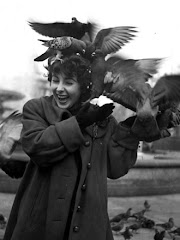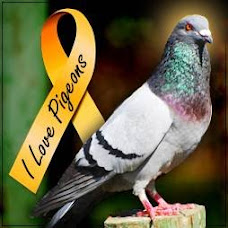by Erik Baard
(see original article here)
One of the stupider “sports” people have come up with is pigeon shooting, where the birds are released from boxes into the line of yahoos’ ready fire. In a 1902 debate over a bill banning the sport from New York, a state senator compared that lack of humanity and sportsman-like behavior to shutting a doe up in a barn and then blasting her as she ran out the open door.
As nearby as Pennsylvania the practice persists, and New York City birds are being stolen to supply the madness. Fortunately, In Defense of Animals is part of the vanguard to stop it. This week the group conferred its first $2,500 award for information leading to the arrest and conviction of a person netting pigeons, also known as rock doves, in NYC. The recipient was Desi Stewart, a street sweeper with the Doe Fund. He spotted Brooklyn resident Isaac Gonzalez spreading seed and netting many pigeons on the Upper East Side of Manhattan. New York State Department of Environmental Conservation officer arrested Gonzalez, who pleaded guilty in Manhattan Criminal Court on June 26, 2008.
It’s a shame Gonzalez didn’t go to prison, if only because we’ll miss the small ironic pleasure of letting him know of his idiocy in trapping for deathly amusement birds whose intelligence might have made them useful allies in alleviating the sufferings of confinement. Kindred criminal spirits in Brazil, at least, were smart enough to attempt to employ the birds as jailhouse smugglers, complete with little pigeon backpacks!
Pigeons have a growing fan base outside “the clink” (is my mother the only person who still uses that expression?) too. National Pigeon Day was Friday the 13th in June, appropriately enough for such a besotted bird. In Defense of Animals, the United Federation of Teachers Humane Education Committee, the New York Bird Club, and luminaries ate pigeon-shaped cookies…and perhaps scandalously snuck a few crumbs to their avian honorees. The contributions of this species, including astonishing heroics in war, rescue, and acts of touching personal loyalty were recounted.
City Councilman Tony Avella, who’s taken the lead on a number of animal rights issues, shared a moving observation. “They are often a city child’s first contact with nature and an elderly person’s only friends,” he said.
One might wonder why there isn’t a greater effort to control pigeon populations, for fear that they might crowd out other, indigenous species. To understand how little worry ecologists have in this regard, here’s a simple exercise: plant your own lush garden or grove of indigenous plants and trees and wait for the pigeons to show up. Or simply visualize the trees on your block being filled with pigeons. It simply won’t happen. The “rock dove” species feeds on the ground and prefers barren areas much like its ancestral cliff sides in Asia Minor. In other words, buildings and asphalt. Not that city life is kind to pigeons. In the wild they live about 14 years, but typically reach only two in urban areas. They do, however, breed a lot more.
If you’d like to get involved in the responsible care and control of pigeons in the city, try volunteering for Pigeon Watch. And remember, if you witness a pigeon netting in the five boroughs of New York City, call New York State DEC Officer Joseph Pane at 718-482-4941. If you need help in rescuing a pigeon of any age or condition, please visit New York City Pigeon Rescue Central. For the simple enjoyment of learning more about this species, one great place to start is Andrew Blechman’s book, Pigeons, which he calls “the world’s most revered and reviled bird.”
All this brings to mind that we’re at a sad centennial: it was in 1908 that zookeepers posted a $1000 reward (more than $23,000 in today’s dollars) for fertile, wild passenger pigeons. That awakening to the crisis was too late and the reward was never collected. Over-hunting and habitat destruction wiped out that species, which once filled North American skies in flocks of billions. Martha, the last of her kind, died in captivity in 1914. I’ll write more about this missing species of pigeons in coming weeks.
Showing posts with label Department of Environmental Conservation. Show all posts
Showing posts with label Department of Environmental Conservation. Show all posts
Thursday, July 3, 2008
Thursday, March 20, 2008
Department of Conservation Replies to Pigeon Nettings




Department of Conservation responses to pigeon nettings:
(a) Please be advised that ECO Buckley will be contacting Inv. Lucas of the ASPCA to assist with this investigation.
(b) Hello,
I am the regional wildlife biologist for the Department (DEC).
William Dunn ASPCA Humane Law Enforcement (212 876 7700 ext 4450) has asked for all witnesses to contact him and assist him in the legal case against these individuals. ASPCA has the lead because the humane aspects offer the most feasible venue for an enforcement case.
Thank you for being alert.
Joseph Pane
Related: Correspondence sent to list.
Monday, January 7, 2008
New York City Officials Moving on Pigeon Poaching

FRESH PIGEON SNIT
Crackdown on Bird Poaching
By ANGELA MONTEFINISE and CATHY BURKE
By ANGELA MONTEFINISE and CATHY BURKE
New York Post
January 6, 2008
January 6, 2008
NET WORTH: Swarms of pigeons — even these pests being fed at Flushing Meadows Corona Park in Queens — can mean cash to an unscrupulous few. Some rustlers sell the fowl for $10 each to legal, out-of-state pigeon shoots, the city Health Department says.
According to city Health Department Commissioner Thomas Frieden, several city and state agencies have recently joined forces to combat "pigeon netting," the underground act of snatching pigeons off the streets and selling them for $5 and $10 each, mostly to legal, out-of-state pigeon shoots.
According to bird advocates, men armed with large nets drive around the city - particularly in the early-morning hours, when birds are hungry - and place seed on the ground to attract pigeons. When the birds come to eat, the men throw nets over them, place them in trucks, and drive off.
"It happens incredibly fast," said one advocate. "This is a solid operation. There are usually groups of guys, and they use several cars with switched license plates. They get $5 a bird to ship them off to pigeon shoots, particularly in Pennsylvania. It's cruel, it's wrong, and it's happening right under our noses and no one's doing anything about it."
Anna Dove of the New York Bird Club, who complained of the bird-napping to Queens City Councilman Tony Avella, said she's battled the problem for 10 years.
"We don't know how big it is, but I think it's big business," she said. "Transporting birds over state lines is illegal. They're not allowed to remove them from their habitat unless they have a permit."
Other advocates said pigeon-nappers also sell to restaurants, although they couldn't provide any evidence.
"We've followed the netters to a warehouse in Queens that sells poultry," said one advocate, who also didn't want to be named. "We're still trying to pull together evidence.
"This is not a joke. A lot of people think, 'Oh, pigeons, what's the big deal?' But it is a big deal. These are wild birds, and they're being stolen right off the street. It's not right."
Avella contacted Frieden's office after receiving Dove's shocking complaint.
Avella contacted Frieden's office after receiving Dove's shocking complaint.
"I was quite surprised," he said of the pigeon-poaching phenomenon. "The city's already moving on this. I think their response proves their level of seriousness."
Health Commissioner Frieden, in a Dec. 14 letter to Avella, said his agency, along with "the Department of Environmental Protection, the Police Department [and] the New York State Department of Environmental Conservation . . . are coordinating our resources in an attempt to address this illegal activity."
He added: "At this time, any citizen observing the illegal netting of pigeons can report details of this act by dialing 311."
angela.montefinise@nypost.com
Related article: http://www.upi.com/NewsTrack/Top_News/2008/01/06/nyc_not_getting_safer_for_birds/3879/
Related article: http://www.upi.com/NewsTrack/Top_News/2008/01/06/nyc_not_getting_safer_for_birds/3879/
NYC not getting safer for birds
Published: Jan. 6, 2008 at 6:44 PM
NEW YORK, Jan. 6 (UPI) -- New York City officials are cracking down on poachers trapping pigeons for sale to out-of-state bird hunters and possibly even restaurants.
Bird lovers say the bird-nappers drive through the city in the early morning, tempting birds with seed and then trapping them in large nets, the New York Post reported Sunday. Then they are sold for $5 or $10. Animal advocates gained the ear of City Councilman Tony Avella, who passed their complaint along to the city, the Post said.
In response, Health Department Commissioner Thomas Frieden said he is starting a coordinated effort with other city and state agencies to combat the practice.Concerned citizens who witness pigeon harvesting can inform authorities by calling the city's 3-1-1 citizen access hotline.
Subscribe to:
Posts (Atom)











